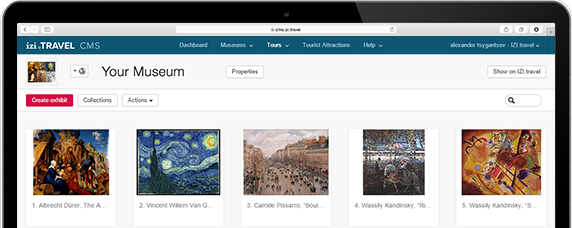Musée
Musée Yekaterinburg Zoo
- Download the applinks
- iOS
- Android
- Windows Phone
Infos Musée
À propos du musée
Update Required To play the media you will need to either update your browser to a recent version or update your Flash plugin.
The mobile guide is a gift from MTS to celebrate the 85th anniversary of Yekaterinburg Zoo. The project is designed to use modern telecoms technologies to make it even easier and more fun for visitors to get to know the animals at the zoo. With the mobile app and an Internet connection, you will be able to find out more information about the animals, learn interesting facts about their lives, look at photos, and most importantly – listen to an audio version in various languages and even hear the sounds the animals make, bears growling, tigers roaring, owls hooting and much more. The app is free and available on Android, iOS and Windows Phone devices. To use the mobile guide, you will need to download the QR code, or install the izi.travel app on your smartphone or tablet, and have a Wi-Fi or mobile Internet connection. We hope you enjoy your visit to Yekaterinburg Zoo with MTS.
About Yekaterinburg Zoo
Yekaterinburg Zoo was founded in 1930. In the first collection there were only 60 animals.
Reconstruction work, which began in 1994, completely transformed the zoo and provided space for a much wider range of animals. The first new pavilion was opened in January 1995, all of the old buildings and enclosures had gone, the zoo had changed beyond recognition.
Birds of prey were housed in new enclosures. A complex was built for predatory animals from the North, as well as a pavilion for birds and exotic predators, and enclosures for bears and Siberian tigers. The Exoterrarium pavilion was used to house reptiles, amphibians and fish; and the second floor was used for warm-climate exotic mammals including tayras, mongooses, fruit bats, and marmosets.
The pavilion for warm-climate predators became the new home for big cats: lions, jaguars, and white tigers. As in other modern zoos, safety glass is now used as a barrier between the predators and the visitors, rather than iron bars.
In 2007, a separate pavilion was built for elephants with a large summer paddock and pool, and in August that year its new resident arrived – an Indian elephant.
The zoo currently houses animals from five continents. The zoo has animals that are listed in the IUCN Red List of Threatened Species, the Red Book of Russia, and the Red Book of the Middle Urals.
The zoo’s collection is continually growing. Every year the zoo’s inhabitants give birth to a wonderful new generation of animals.
Yekaterinburg Zoo works actively with zoos in Russia and Europe to pair animals together and conserve rare species.
About Yekaterinburg Zoo
Yekaterinburg Zoo was founded in 1930. In the first collection there were only 60 animals.
Reconstruction work, which began in 1994, completely transformed the zoo and provided space for a much wider range of animals. The first new pavilion was opened in January 1995, all of the old buildings and enclosures had gone, the zoo had changed beyond recognition.
Birds of prey were housed in new enclosures. A complex was built for predatory animals from the North, as well as a pavilion for birds and exotic predators, and enclosures for bears and Siberian tigers. The Exoterrarium pavilion was used to house reptiles, amphibians and fish; and the second floor was used for warm-climate exotic mammals including tayras, mongooses, fruit bats, and marmosets.
The pavilion for warm-climate predators became the new home for big cats: lions, jaguars, and white tigers. As in other modern zoos, safety glass is now used as a barrier between the predators and the visitors, rather than iron bars.
In 2007, a separate pavilion was built for elephants with a large summer paddock and pool, and in August that year its new resident arrived – an Indian elephant.
The zoo currently houses animals from five continents. The zoo has animals that are listed in the IUCN Red List of Threatened Species, the Red Book of Russia, and the Red Book of the Middle Urals.
The zoo’s collection is continually growing. Every year the zoo’s inhabitants give birth to a wonderful new generation of animals.
Yekaterinburg Zoo works actively with zoos in Russia and Europe to pair animals together and conserve rare species.
Quoi de neuf
В Екатеринбургском зоопарке поселился Арктический волк Туман. Новый питомец прибыл в Екатеринбург из Ижевского зоопарка.
После прохождения обязательного месячного карантина, волка перевели на экспозицию, где он и поселился. Поселившись в новый дом, Туман с любопытством изучил окружающий его интерьер и обнюхал новые предметы и элементы обогащения среды. Новое соседство оценили и другие представители хищников северных и умеренных широт, необычное поведение стали проявлять пумы и серая волчица, к которой через пару месяцев, когда арктический волк освоится, поселят для создания пары.
Туману 4 года, это уже половозрелый самец, он отличается своенравным характером и старается держаться подальше от людей, несмотря на то, что ведет себя игриво.
Встречаются арктические волки на группе арктических островов в Северной Америке и в северной части Гренландии. Они держатся стаями для более эффективной охоты и питаются северными оленями и овцебыками, а также арктическими зайцами и леммингами. В зоопарке, как и в природе, у волка в рационе присутствует мясо - это говядина и курица.
После прохождения обязательного месячного карантина, волка перевели на экспозицию, где он и поселился. Поселившись в новый дом, Туман с любопытством изучил окружающий его интерьер и обнюхал новые предметы и элементы обогащения среды. Новое соседство оценили и другие представители хищников северных и умеренных широт, необычное поведение стали проявлять пумы и серая волчица, к которой через пару месяцев, когда арктический волк освоится, поселят для создания пары.
Туману 4 года, это уже половозрелый самец, он отличается своенравным характером и старается держаться подальше от людей, несмотря на то, что ведет себя игриво.
Встречаются арктические волки на группе арктических островов в Северной Америке и в северной части Гренландии. Они держатся стаями для более эффективной охоты и питаются северными оленями и овцебыками, а также арктическими зайцами и леммингами. В зоопарке, как и в природе, у волка в рационе присутствует мясо - это говядина и курица.
Programmer votre visite


- Екатеринбургский зоопарк, 189, улица Мамина-Сибиряка, ЖК "Армада", Парковый, Октябрьский район, Iekaterinbourg, городской округ Екатеринбург, Oblast de Sverdlovsk, District fédéral de l'Oural, 620026, Russie
-
- Aujourd'hui:
- 09:00 - 17:00
- Lun
- 10:00 - 19:00
- Mar
- 10:00 - 19:00
- Mer
- 10:00 - 19:00
- Jeu
- 10:00 - 19:00
- Ven
- 10:00 - 19:00
- Sam
- 10:00 - 20:00
- Dim
- 10:00 - 20:00
- http://зоопарк.екатеринбург.рф/
Pièces exposées
Objets exposés présentés avec fichier audio
Commentaires
15 avis
Évaluer cette visite-
06-15-2023
Очень давно не была в этом зоопарке, изменения величайшие! Интересные вольеры, отсутствие характерных запахов, кроме одного, у замечательной Даши. Всех благ зоопарку , дальнейшего процветания, а стремиться всегда есть к чему.
-
04-15-2022
Неплохой гид, удобно с ним гулять. Открывать лучше по павильонам, там очередность соблюдается
-
03-02-2022
Piękny ogród, tylko jego zwiedzanie zakłócają alarmy bombowe na Ukrainie. Powstrzymajmy atak!
-
11-04-2019
слон классный.
-
09-29-2018
Классный зоопарк)
Téléchargez l'appli gratuite izi.TRAVEL
Créez vos propres visites audio!
L'utilisation du système et de l'appli de guide mobile est totalement gratuite



